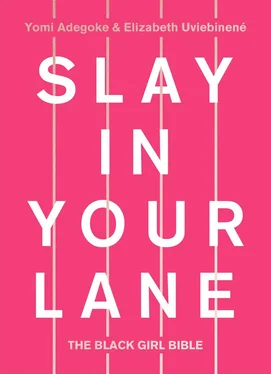Results day came and, much to my surprise, I did well and my parents were pleased. My panic had propelled me into finding work experience that would go on to prove valuable in my career, so I don’t regret that move, but looking back on that summer, what I do regret, and find depressing, is how I let my crippling fear of not doing well and letting other people down take over my life. Instead of making the most of those weeks I spent them waiting anxiously and fretting about my future. Why? Where did my lack of faith in myself come from? On balance, when I look back on it, the work experience was a good thing for me to do, it was just the circumstances that drove me to do it that were far from ideal.
In my school, unless you were identified as a gifted and talented student achieving straight As and exhibiting model behaviour, it was almost inevitable that you would fall through the cracks and be forgotten about. By the time it came to making decisions about your future, you could find yourself in a no-man’s land, caught between your parents’ very high expectations and the lower opinions of the teachers who doubted your ability – not forgetting the usual teenage peer pressures. For me, this self-doubt then developed into a loss of self-esteem, and anxiety crept in about what I was good at and how I could translate that into a future.
When the time came to take the exams, I had noticed that some of my friends didn’t believe they could possibly do well, so they just started to give up and misbehave – because this seemed to be what was expected anyway. This tension often became a ‘one-way ticket’ to disengagement, and so they began to succumb to that feeling – whether they had started out well-behaved and ambitious, or not. Being doubted by your teachers and put under great pressure from your parents created a sometimes toxic combination. The truth about educational achievements is often more complex than the stats suggest.
When the topic of race and education is covered by the media it is usually cast in an overwhelmingly negative light. When they aren’t focusing on the low achievement of white working-class boys, the experiences of ethnic minorities are characterised by low aspirations, high exclusion rates and subsequent underachievement. With black children, the spotlight tends to be focused on black boys – perhaps understandably, because their educational attainment levels are shockingly low compared to black girls. As a result black girls are largely rendered invisible within the education conversation, so there has been little contemporary research and literature that looks into their experience of our education system, asking the question: how are black girls in the UK really doing in school?
.....................................................
‘My friend, face your books, not this Facebook.’
Unknown African parent
.....................................................
It’s not hard to see why an extremely high value was placed on education in my childhood home and in the homes of my friends, as well as in those of many of the women we interviewed for this book. We are a generation of people who grew up with parents – or grandparents – who had gained professional qualifications in the countries they had migrated from, but who often found it difficult to get jobs in the UK that reflected their skill sets because those qualifications weren’t always recognised when they went to job interviews. Educated though they were, they often faced discrimination as they entered the labour market, and many had to take jobs for which they were overqualified.
Our parents appreciated the value of education and the opportunities it could bring. As mine would often remind me: ‘Back home we do not have the same opportunity that you children have here. Education makes a way for you.’ Despite this, they also weren’t in the dark about how difficult it was going to be for us to navigate our future in Britain, and so they would also make us aware that ‘this isn’t our country; we have to work harder’. My parents had extremely high ambitions for me and my siblings. In their eyes, ‘the sky’s the limit’– if you worked hard, you would go far. I would hear them talk to their friends in true Nigerian style about how I would be doing a masters, when I hadn’t even got into university yet. They believed that education led to job opportunities, and, perhaps unsurprisingly, as Karen Blackett’s father did, they often steered us towards careers such as law and medicine – professions in which no one can deny your qualifications, regardless of the colour of your skin and the prejudice you might come across. From our parents’ perspectives these traditional professions would give you job security.
Bola Agbaje, Olivier Award-winning playwright and writer, had a similar experience growing up: ‘For African parents, I think it was just that thing that they wanted stability. A lot of parents who are first generation, they want their kids to be lawyers and doctors and things like that because those are the jobs that create stability, and also you can be wealthier with those type of jobs. So for them, they want their kids to have better lives than they had, so that’s why they push their children into those types of careers.’
Educational researchers acknowledge that, of all factors within the home, parental values and aspirations have the largest positive effect on children in school. However, the high aspirations and motivations of ethnic minority parents do not always translate into the greatest achievement in the classroom, and there has been little research into why this might be the case. When black children enter the school system at five they perform as well as white and Asian children in literacy and numeracy tests. Their results are largely in line with the UK average, with literacy at 67 per cent and numeracy at 75 per cent, compared to the national averages of 69 per cent and 76 per cent respectively. However, by the end of primary school as they enter secondary school, aged 11, black pupils’ attainment falls behind. 1
When we look a little deeper, it’s noticeable that there are differences in achievement levels between the different black groups. In the 2013–14 academic year, 56.8 per cent of British African students achieved A*–C grades – slightly above the national average of 56.6 per cent. This attainment level places them alongside Indian and Chinese pupils as the country’s highest ethnic achievers. However, in sharp contrast, Black Caribbean pupils have a 47 per cent pass rate, trailing by nearly ten percentage points. On the whole, black pupils achieved the least in the five top GCSE grades out of all ethnic groups, but it is the performance of Caribbean pupils that averages out at 53.1 per cent. 2There has been a corresponding lack of research into the differences in attainment levels between Black African and Black Caribbean pupils.
Not enough has been done to try to understand why a disparity exists between different black groups. Instead, the two groups are often amalgamated into one, which means we are unable to see emerging patterns and there’s a tendency for many children to be left sidelined unless they are doing really badly. This lack of substantial research is especially apparent when it comes to the attainment levels of black girls. Althea Efunshile CBE, former deputy chief executive of Arts Council England, explains: ‘I have sometimes wondered if black girls who don’t do as badly as black boys are invisible in the education system. Because if you compare them to black boys, they’re doing better, and so people say, “Right, okay, we don’t need to worry about them so much.” But if you compare them to white girls, they’re not doing as well.’
Young black girls appear to value education highly: they want to succeed and try their best to navigate the school system. But as they progress through secondary school it seems that factors come into play that often lead to them not fulfilling their potential. Heidi Mirza is Professor of Race, Faith and Culture at Goldsmiths College, University of London, and has written extensively on ethnicity, gender and identity in education, most notably in her book Young, Female and Black (1992). As she pointed out when we spoke to her, ‘Everyone says black girls do well, there’s no problem for them. They do better than the boys, they do better than black boys, they do better than white working-class boys, and they’re doing better than white working-class girls, what’s the deal? We don’t even need to look at them; in education they’re kind of sorted. But actually, when you look down and you drill down, as I did for Young, Female and Black , what I found was that there are so many mythologies around black womanhood, and the fact that there’s always the “strong black woman that survives narrative”. All the theories and studies were saying was that, because they’ve got that inner strength, they do well, and what I found was, yes, they have that inner strength, yes, their parents really valued education enormously, and pushed them to do well – some did, some didn’t, but at the same time there were structural things like racism, schools with not very good teachers, issues around poverty, resourcing, government policies, that they had to contend with, and the fact that they do well is because they overcame that, they learnt to navigate the system.
Читать дальше












